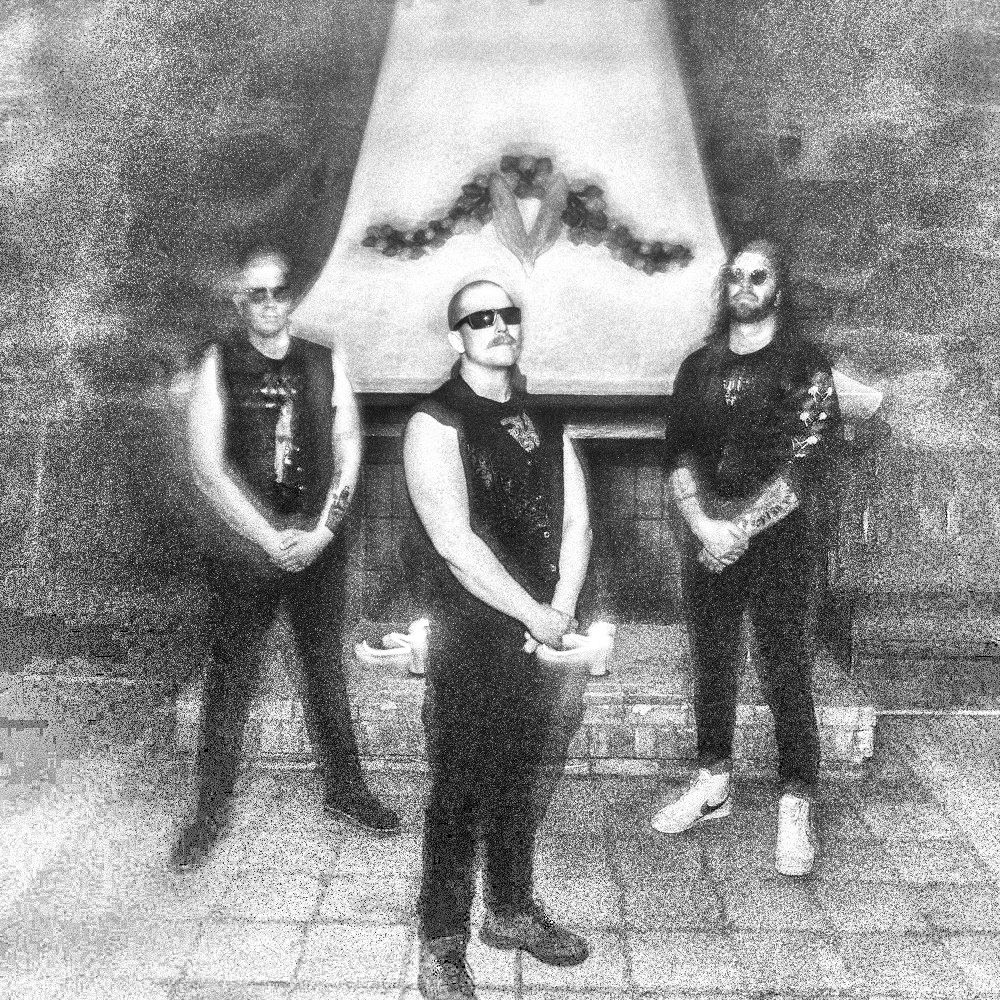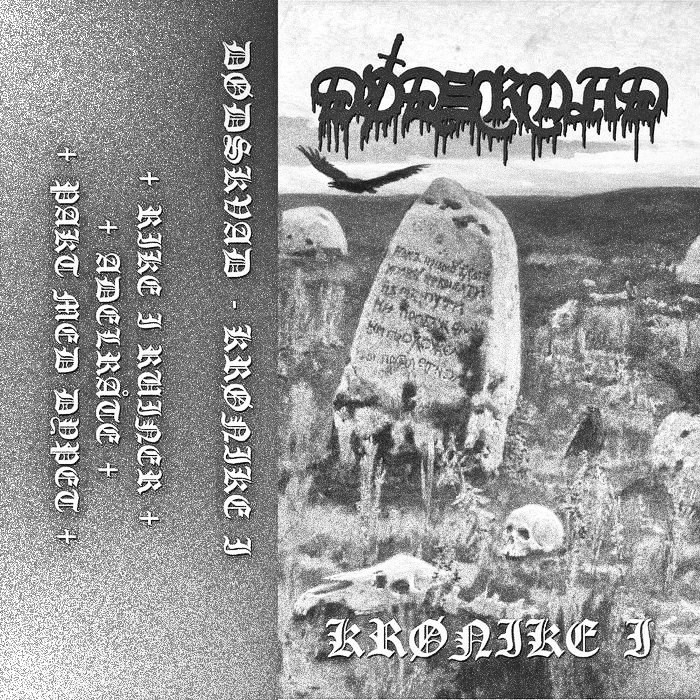
“If you go straight ahead, there will be no life...
there is no way forward for he who travels past, walks past or flies past...”
DØDSKVAD is a Norwegian death metal entity rooted in the medieval imagination of old Norway. Scandinavian plague-era folklore paints their brand of raw death metal, within the lineage of AUTOPSY and TIMEGHOUL while drawing heavily from Nordic visual art and archaic ritualism. Less a band seeking acclaim than a vessel for archaic memory, DØDSKVAD sound less like revivalism and more like exhumation.
Norway’s reputation as a black metal stronghold tends to overshadow its quieter but equally potent death metal underbelly. DØDSKVAD’s first demo on CALIGARI RECORDS stands as proof of that lineage still mutating in the shadows.
 Its reception was unusually strong for a first offering, prompting curiosity as to how such an alliance came to be in the first place.
Its reception was unusually strong for a first offering, prompting curiosity as to how such an alliance came to be in the first place.
DØDSKVAD: “CALIGARI RECORDS contacted me shortly after the digital release of our demo. They have an awesome roster of bands and have been a pleasure to deal with. It’s good to see such professionalism in a small tape label, and their efforts are paramount to ensure that these marginal genres thrive.”
While most debut releases focus on atmosphere first and meaning later, ‘Kronike I’ presents itself as a fully conceptual piece, unified as much by its medieval tonality and imagery as its riffs. The lyrics seem to operate less as embellishment than as historical fiction set to blast beats.
DØDSKVAD: “Most of the lyrics were written before the music and was originally intended for a synth project. Somewhere along the way, it warped into death metal. The lyrics are meant to guide the listener along a fantastical depiction of old Scandinavia in the Middle Ages around the time after the Christianisation of Norway and up to the plague. Heathen tribes were forced into the forests and mountains and waged war from their hidden abodes. The following releases will be set in the same realm. The artwork is from Viktor Vasnetsov’s Knight at the Crossroads. I have always been captivated by his art and his depictions of nature and mythology, so that choice was easy. The carving on the stone in the motif ties in nicely with the lyrics for ‘Rike I Ruiner’.”
At a concise 18 minutes, the release walks the line between demo and fledged EP. Its momentum begs the question of whether DØDSKVAD intend to prolong the format going forward or expand into a conceptual full-length.
DØDSKVAD: “Material for a second release is already written and will be recorded this year. It looks to be around 25 minutes of music at this point. I like the EP/demo format, but who knows, maybe an album is in the cards. There are even more riffs macerating in the vat of decay.”
With the benefit of hindsight, the band has continued with this demo approach, with additional demoes 'Kronike II' and 'Kronike III' released two years apart.
Though black metal mythology looms largest as Norway’s chief cultural export, the country’s approach to death metal has developed on its own terms… insular yet distinct...
DØDSKVAD: “I would say the death metal scene here is healthy, albeit small. People are getting older, and there seems to be a lesser influx of new blood in the scene. A lot of the older, more established bands are still churning out good music, though, and there’s quality among the newcomers as well. World class acts like OBLITERATION, EXECRATION and DISKORD are still going strong.”
“I’ll implore the good readers to check out the new SAPROPHAGE and SOVEREIGN releases, whenever they may appear, for some good, underground Norwegian death metal.”
DØDSKVAD’s approach is notably disciplined. Aggressive without resorting to constant escalation and intensity. In an era where extremity often substitutes for structure, restraint works best for this band.
DØDSKVAD: “As with everything, it’s a balancing act. Much of the death metal from the ‘90s and ‘00s lacks any form of dynamic, which is what makes bands like AUTOPSY, INFESTER and TIMEGHOUL so interesting. The youthful and naïve spirit of old MANTAS/DEATH, the first IMMOLATION, MORBID ANGEL etc. is also often sorely lacking. Riff salad is also a double-edged sword in this genre. Chaos is good, but so is the sense of a snaking path through the songs and some sense of coherence. MORBUS CHRON’s 'Sweven' is a shining star here.”
DØDSKVAD: “These are some of my ideals when writing for this project, although that might be a tall order for an old troglodyte like me.”

While many bands these days chase broader acclaim, others seem content to exist as regional entities, operating at full strength without ever seeking the limelight. DØDSKVAD appear firmly aligned with the latter philosophy, in typical Norwegian fashion.
DØDSKVAD: “I think it depends solely on the band in question. I am perfectly happy with being a smaller entity, seeing as most of us have families or other responsibilities, and time is a commodity. Building a band from scratch can be a chore because of this. The days when we were in our early twenties and could just mess around in the rehearsal space and pound beers whenever we wanted are long gone. I am lucky to have capable friends that are willing toto play with me. Acclaim, local or global, is not really a worry.”
Guitarist T.J. is also currently riding out with death/thrash band SOVEREIGN, whose album 'Altered Realities' piqued my interest in 2024.
Typically, their influences extend beyond music. Less from scenes than from images and landscapes that imbue their sound with historical weight, being of Scandinavian stock.
DØDSKVAD: “National romantic and mythological visual art has always been inspiring, like the Vasnetsov. Fair mention to other classics like Akseli Gallen-Kallela, John Bauer, J. C. Dahl, Gerhard Munthe etc.”
The works of Bauer and Munthe capture that hazy borderland between folklore and reality. Bauer’s forests feel inhabited in a way modern fantasy rarely dares to emulate, while Munthe’s compositions, meanwhile, carry that stern austerity which mirrors the cold pragmatism in much of Norwegian death metal. Perhaps less about escapism and more about communing with an ancestral mindset.
DØDSKVAD: “As far as films go, I would mention ‘The Name of the Rose’, ‘Henry V’, ‘El Cid’, ‘The Seventh Seal’ and ‘Flesh + Blood’. I am into anything with a gritty, medieval atmosphere.”
What unites these films is not merely their historical setting but their refusal to romanticise the past. The adaption of Umberto Eco’s 'The Name of the Rose' cloaks intellectual paranoia in monastic silence, while Paul Verhoeven’s 'Flesh + Blood' from 1985 is what I would say outright pestilent. In a death metal sense, it’s chaotic, lustful, and morally unhinged. Both films reject clean narrative arcs in favour of grime and ambiguity, which aligns neatly with the kind of death metal that values tension over triumph.
DØDSKVAD: “There’s much inspiration to be found in the physical arts as well. Being outside, hiking, climbing, squatting... whatever you can do to improve the state your corpus will also give your mind and music a keener edge. You are the sword.”
Ultimately, the project seems driven not by competition or legacy, but by necessity.
DØDSKVAD: “This is purely a creative outlet and a good way for me to be able to cooperate with friends and musicians I like and respect. I guess you could say paying homage to the days of yore and the old way of creating death metal is a motive, but the goal is always just to finish the latest project. Any interest we receive is nice, of course, but it never drives the creative process.”
This post contains interview excerpts originally printed in Flail ov Venom, Issue 3 (Autumn 2022).
